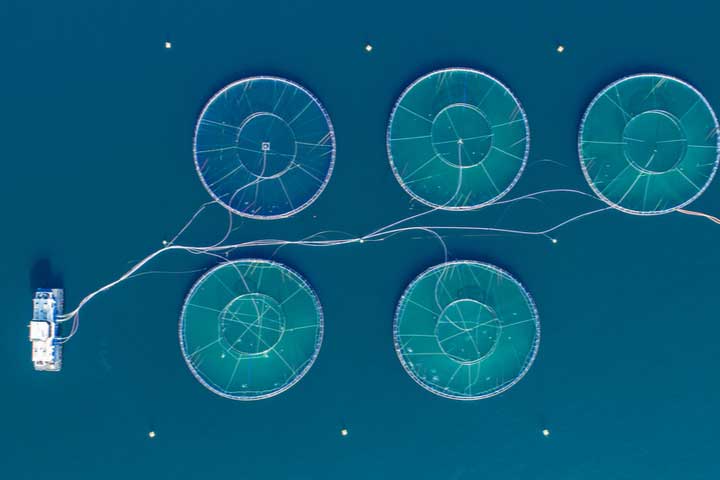National Ocean Service describes the aquaculture as the process of breeding, rearing, and harvesting of aquatic creatures including fish, shellfish, algae, and other marine organisms in all types of water atmospheres.
With the increased demand of sumptuous seafood delicacies worldwide and technologies advances, it has become possible to grow food in coastal marine waters and the open ocean.
Request Exclusive Sample Report here @ https://www.researchdive.com/download-sample/347
Aquaculture, to be more precise, is skillful procedure of nurturing aquatic organisms for human consumption. It goes in the same line to agriculture, if we replace plants or livestock with fishes.
Fish farming is another term referred to aquaculture. Aquaculture can be performed anywhere from coastal ocean waters to freshwater ponds and rivers to tanks on the land.
Different Types of Aquaculture
- Mariculture
Mariculture needs seawater. This type of aquaculture is done either by the ocean, a segmented part of the ocean, or in ponds containing seawater. Molluscs, shellfish, prawn, and seaweed are the marine organisms often bred in such parts of the oceans.
Another great fragment of mariculture is the seaweeds. These seaweeds and species are used in cosmetics and jwelry manufacturing industries. For instance, collagen extracted from seaweed is used in some facial creams whereas pearls are hand-picked from molluscs and turned into stunning fashion accessories.
Connect with our expert analyst to get more details@ https://www.researchdive.com/connect-to-analyst/347
- Fish Farming
Needless to say that fish farming is the basic type of aquaculture. The process includes the careful breeding of fish. It can be done in any freshwater, preferably seawater. This method of breeding helps in creating a source for food and consumption.
Comparatively easier, the process of fish farming only needs proper water conditions and temperatures. There is no need of a larger space for this type of farming as the breeding species such as tilapia are way too small.
- Algaculture
Algaculture involves the farming of algae. As we all know, algae are microbial organisms with resemblance to animal and plant characteristics. For economic viability, they are harvested in huge numbers. Algae are used for various purposes. An example of such application is the source of energy for smartphones. Exxon mobile is working towards developing them as a new energy source.
- Open-net pen and Cage Systems
Open-net pen and Cage systems are another types of aquaculture which are implanted offshore and in freshwater lakes.
First, net cages of between 6 and 60 cubic feet (pens) are implanted in the water with the fish inside it. With a high absorption of fish in the pens, water environments become purified from chemicals, wastes, or parasites. The fishes in the net cages also entice predacious animals and bigger fish, which are get trapped in the nets.
Amazing Benefits of Aquaculture
Studies proved that aquaculture has brought immense positive impact on the global food production industry. Some of the amazing benefits of aquaculture are mentioned below:
Rich source of micronutrients and animal protein
Aquaculture or fish farming is considered as a great source of protein. Fish fulfills the day today necessity of animal protein to more than 1 billion people worldwide with poor resources, which is a product of aquaculture.
Micronutrients, found in fishes, are also important for proper cognitive and physical development of children. Thus, aquaculture helps in overall development of people worldwide.
It conserves the aquatic population
Aquaculture helps in preserving the population of wild aquatic plants and other organisms by averting the extinction of such species which is caused by unrestrained mistreatment.
A Nurturer of biodiversity and ecosystem
It is another great benefit of aquaculture. The techniques of aquaculture have resulted in the discovery of ways in which diverse aquatic organisms and plants can coexist naturally. Thus, aquaculture helps in decreasing environmental waste and augmenting the proper functioning of the ecosystem.
Employment Opportunities
Aquaculture also brings various career opportunities. As an emerging field of career, aqua farming will create ample job opportunities.
Conclusion
To sum up, the aquaculture is an emerging industry for fish firming and conserving biodiversity. The market will grow and create various opportunities in near future.
Request for this Report Customization & Get a 10% Discount on this Report@ https://www.researchdive.com/request-for-customization/347
Related Reports:
About Us:
Research Dive is a market research firm based in Pune, India. Maintaining the integrity and authenticity of the services, the firm provides services that are solely based on its exclusive data model, compelled by the 360-degree research methodology, which guarantees comprehensive and accurate analysis. With unprecedented access to several paid data resources, a team of expert researchers, and a strict work ethic, the firm offers insights that are extremely precise and reliable. Scrutinizing relevant news releases, government publications, and decades of trade data, and technical white papers, Research dive delivers the required services to its clients well within the required timeframe. Its expertise is focused on examining niche markets, targeting their major driving factors, and spotting threatening hindrances. Complementarily, it also has a seamless collaboration with the major Market aficionado that further offers its research an edge.
Contact Us:
Mr. Abhishek Paliwal
Research Dive
30 Wall St. 8th Floor, New York
NY 10005 (P)
+ 91 (788) 802-9103 (India)
+1 (917) 444-1262 (US) Toll
Free: +1 -888-961-4454
Email: support@researchdive.com
LinkedIn: https://www.linkedin.com/company/research-dive
Twitter: https://twitter.com/ResearchDive
Facebook: https://www.facebook.com/Research-Dive
0






